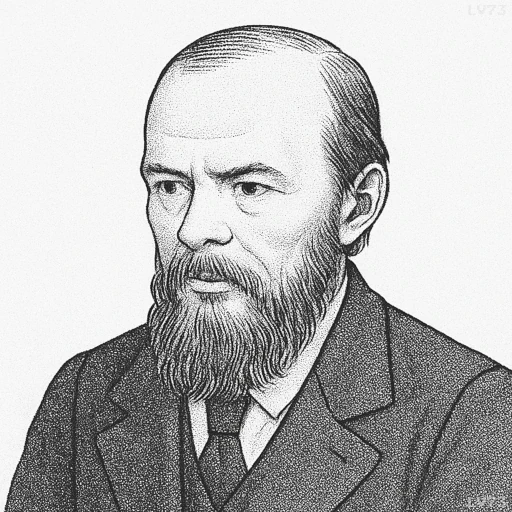“The greatest happiness is to know the source of unhappiness.”

- November 11, 1821 – February 9, 1881
- Born in the Russian Empire
- Novelist, philosopher
table of contents
Quote
“The greatest happiness is to know the source of unhappiness.”
Explanation
Dostoevsky’s quote reveals a profound insight into the relationship between suffering and awareness. According to Dostoevsky, true happiness is not found in the absence of pain or difficulty, but in the understanding of the causes behind one’s unhappiness. This perspective suggests that self-awareness—the ability to recognize the root of one’s struggles—brings a kind of clarity that can lead to peace and ultimately a more authentic form of happiness. Dostoevsky often explored themes of suffering and the human condition, emphasizing that confronting and understanding one’s inner pain is an essential step in personal growth and redemption. The wisdom that comes from understanding the sources of our unhappiness allows us to transcend it, rather than simply escaping it.
This concept echoes Dostoevsky’s belief that self-examination is a crucial part of moral and spiritual development. In works like Notes from Underground and Crime and Punishment, characters are often confronted with profound internal conflicts that they must eventually face in order to grow. Raskolnikov, for example, suffers greatly from his crime, but it is only through acknowledging his guilt and understanding the depths of his own moral conflict that he begins to experience any form of redemption. Similarly, in The Brothers Karamazov, characters like Ivan Karamazov are tormented by existential doubt and the question of suffering, yet their ultimate peace lies in their ability to confront the sources of their anguish—whether through faith, acceptance, or personal insight. In this sense, the greatest happiness is not the absence of pain, but the ability to confront it and understand its origins.
In the modern context, this quote suggests that our ability to identify and understand the sources of personal dissatisfaction—be it related to work, relationships, or inner conflict—can be the first step toward achieving a more meaningful and balanced life. In a world where many are constantly in pursuit of external achievements, pleasure, or comfort in an attempt to avoid discomfort, Dostoevsky’s insight challenges us to reflect deeply on what is at the root of our unhappiness. Whether it is unresolved trauma, unmet needs, or misalignments between our values and actions, acknowledging and understanding these sources can offer a pathway to healing and growth. In this way, Dostoevsky’s quote aligns with modern therapeutic practices, which emphasize the importance of self-awareness and insight as key to achieving emotional resilience and a deeper, more lasting happiness.
Would you like to share your impressions or related stories about this quote in the comments section?


